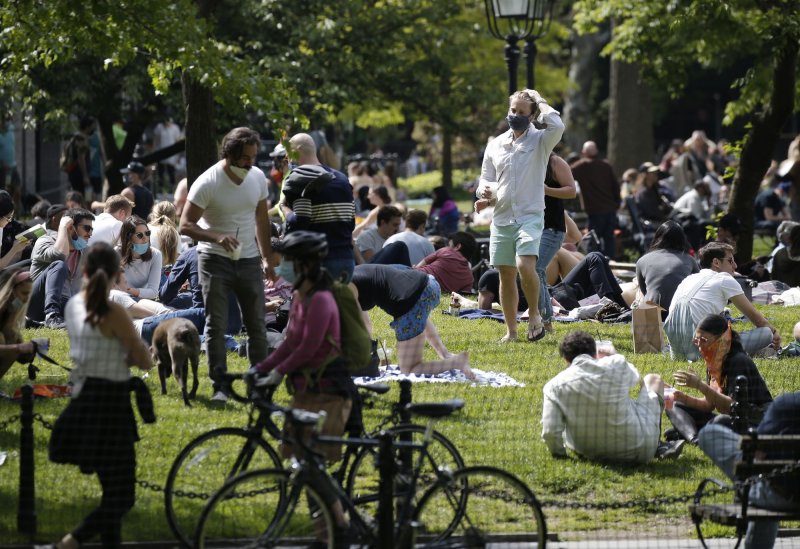People gather in Washington Square Park for Memorial Day Weekend during the coronavirus pandemic in New York City in May 24. Photo by John Angelillo/UPI |
License Photo
June 18 (UPI) -- African Americans, men and younger adults have less knowledge about COVID-19 and the risks posed by the new coronavirus, SARS-CoV-2, according to the results of a survey published Thursday by JAMA Network Open.
Although roughly 80 percent of the respondents said they know the symptoms of COVID-19, the disease caused by the new coronavirus, and how it's spread, African Americans and Latinx adults were up to 10 percent less likely to have accurate information in these areas than their white peers, the survey found.
Similarly, men were at least 5 percent less likely to have knowledge of disease symptoms and spread than women, researchers said.
African Americans and men are at greater risk for COVID-19 in general, and for serious illness from the virus specifically, according to the U.S. Centers for Disease Control and Prevention.
"Overall, the public is fairly aware of the basic facts about how COVID-19 spreads and how to protect themselves, but there are clearly some important gaps ... between African American, Latinx and white respondents," co-author Marcella Alsan, a professor of public policy at the Harvard Kennedy School, told UPI.
In the case of Latinx respondents, language barriers "could indeed be part of it but [in general] trust between the messenger [providing the information] and the intended recipient seems important," she said.
The sources for information on COVID-19 likely play a role in levels of pandemic knowledge and appear to differ along racial lines, according to Alsan.
Among those who relied on public health organizations and officials for information and guidance on the coronavirus, 63 percent were white, 10 percent were African American and 18 percent were Hispanic, according to a Pew Research survey published May 20.
African Americans account for 13 percent of the total U.S. population, according to figures from the 2010 census.
For their survey, Alsan and her colleagues interviewed 5,200 American adults between March 29 and April 13, the height of the outbreak in some parts of the United States.
African-American respondents were nearly 4 percent more likely to report being infected with the new coronavirus and 7 percent more likely to know someone who had tested positive for COVID-19 than white respondents, the researchers found.
Among other findings, 87 percent of respondents correctly identified all three primary symptoms of COVID-19 -- fever, cough and difficulty breathing -- while 86 percent knew that the disease was spread via respiratory droplets.
Ninety-four percent said they were aware that those with no obvious symptoms could still pass the virus to others.
However, African-American and Latinx respondents were significantly less likely to report knowing these facts about COVID-19, they found. This mirrors a survey conducted by researchers at Yale University in March.
That survey found that 84 percent of black respondents and 89 percent of Hispanic/Latino respondents were aware of asymptomatic spread, compared to 94 percent of white respondents.
Fewer black and Hispanic or Latino respondents to the Yale survey also were able to correctly identify the symptoms of COVID-19.
For the United States to successfully control the spread of COVID-19, communities most at risk from the disease need to have access to "trusted guidance on how to protect themselves," Alsan and her colleagues said.
In addition to being less well informed, African Americans, men and younger adults were also more likely to leave their homes than those in other demographic groups, they said.
Earlier research has suggested that African Americans and men make up higher percentages of "essential workers," meaning many of them have to venture out, even during lockdowns.
"[It's] important to ensure that messages on how to protect oneself are combined with resources so that disadvantaged individuals have the tools they need to take the steps necessary to protect themselves and their communities," Alsan said.















